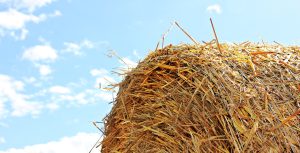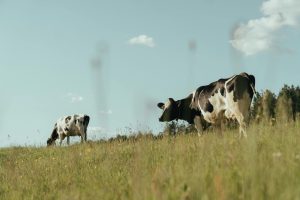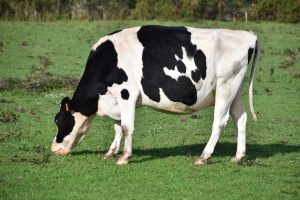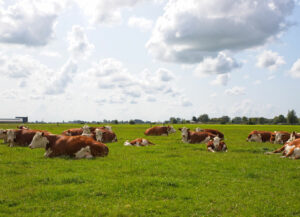Álvaro García
Immunity plays a crucial role in preventing various dairy cow illnesses, and mastitis stands out as one of the most widespread and economically impactful conditions. A cow’s overall health and productivity relies significantly on a strong immune system, which includes physical barriers, innate immunity, and adaptive immunity. Physical barriers, such as skin and mucosal linings, prevent pathogen entry. Innate immunity, featuring cells like neutrophils and macrophages, provides immediate protection. Meanwhile, adaptive immunity coordinates the production of antibodies and specialized cells designed to address specific threats. Dairy cows hit their peak milk production roughly three months after giving birth, but this time also comes with a higher risk of health issues, especially mastitis, which seriously affects milk yield. When mastitis kicks in during this crucial phase, it significantly impacts future milk production and leads to more cows being culled. Infections in the mammary gland during the dry period also increase the chances of mastitis in the next lactation. A mix of factors like reduced immunity, increased nutrients for bacterial growth, and the stress around giving birth makes cows more susceptible to mastitis during this time.
Mastitis: Immunity, Management, and Probiotic Potential
Mastitis, an inflammatory condition of the mammary glands, primarily stems from bacterial infections, presenting either clinical (visible symptoms) or subclinical (invisible symptoms) manifestations. Common pathogenic bacteria like Staphylococcus aureus, Streptococcus agalactiae, and Escherichia coli drive mastitis, exacerbated by factors like poor milking hygiene, environmental conditions, and compromised immunity. A robust immune system remains key in preventing mastitis, as immune cells progress to the infection sites to combat pathogens. However, stress, poor nutrition, and concurrent health issues can weaken immunity, heightening mastitis vulnerability.
The repercussions of mastitis are broad, diminishing milk production, altering milk composition, and compromising animal well-being. Clinical mastitis manifests visible signs, while subclinical mastitis, despite being concealed, disrupts milk quality and long-term udder health, compromising productivity. Holistic mastitis management includes hygiene protocols, proper milking practices, health checks, and vaccination. A clean environment, correct milking practices, timely treatments, and culling strategies are critical. Strengthening immunity through balanced nutrition, stress mitigation, and adequate rest significantly reduces mastitis incidence.
Several microorganisms, including Bacillus species, exhibit potential as probiotics for managing bovine mastitis. Studies have highlighted the protective effects of certain probiotics against mastitis-causing pathogens in mice, offering promise in enhancing innate immunity and reducing mastitis symptoms in cows. Bacillus subtilis (BS) intake by dairy cows has resulted in decreased mastitis occurrences, lower medication days, reduced discarded milk, consistently lower milk SCC levels, enhanced specific immune cell proportions in blood, and decreased cortisol and thiobarbituric Acid Reactive Substances (TBARS). The TBARS are used as a measure of oxidative stress or lipid peroxidation in a sample. High levels indicate the presence and quantity of compounds that react with thiobarbituric acid, often used as a marker for the breakdown of lipids or fats in the body due to oxidative damage. High TBARS levels might suggest increased oxidative stress and potential damage to lipids or fatty acids in cells or tissues.
Research exploring orally administered probiotics’ effects on bovine mastitis remains limited. Nevertheless, evidence suggests potential mechanisms like entero-mammary bacterial migration and modulation of the common mucosal immune system. Studies indicate the potential movement of intestinal microorganisms, including probiotics, to the mammary gland, hinting at their potential for enhancing mammary gland immunity. Further exploration into the interaction between probiotics and bovine immune cells could elucidate their mechanisms of action and aid in selecting probiotic feeds to enhance resistance against bovine mastitis.
Bacillus subtilis: Advancing Mastitis Management in Dairy Cows
Strains of Bacillus subtilis can form spores that are highly resilient, capable of surviving harsh conditions. It has recently been found that feeding BS to dairy cows can significantly decrease the incidence of mastitis, especially in cows with a previous history of the condition. The probiotic seems to have multifaceted effects, potentially influencing aspects like the cow’s immune system, stress levels, metabolic balance, and even the response of immune cells to inflammation. The exact mechanisms by which it operates to reduce mastitis risk are still under investigation, but its ability to create a more balanced gut environment and potentially modulate the cow’s overall health seems to be a key factor. This strain shows promising potential as an alternative to antibiotics in preventing mastitis in dairy cows, offering a more sustainable and potentially effective solution.
A recent study (Urakawa er al. 2022), tested BS to see if it could stop mastitis in cows with a history of the condition. The researchers focused on the dry period and three months postpartum, feeding the probiotic starting a month before birth. The cows supplemented with the probiotic had way fewer mastitis cases compared to their own previous lactation and compared to the cows that didn’t receive it. Also, the probiotic-fed group consistently kept a low somatic cell count in their milk. It is well-known that lactic acid bacteria are pretty good at battling inflammatory diseases like mastitis, but this study was the first to show just how effective BS is in reducing mastitis in cows that’ve had it before.
Key findings of this research
This study noticed something interesting: while levels of plasma BUN and total cholesterol shot up fast after birth in the normal group and quickly evened out, the probiotic-fed group had a slower but steadier recovery. That slower pace suggests that the probiotic-fed cows were better at bouncing back from the energy imbalance after giving birth. They also reported that probiotic-fed cows had lower stress hormones (cortisol) and signs of less oxidative stress (thiobarbituric Acid Reactive Substances) in their blood compared to the others. This is very important because stressed-out cows around birth can have a tough time with milk production. This probiotic seemed to help these high-yield cows deal better with all the changes happening in their bodies.
This study also took an extensive look into the cow’s immune system. They found that the probiotic-fed group had slightly lower T and B cell populations than the others. Specifically, they had more CD4+ T cells but fewer other types of T cells and B cells. What’s interesting is that these changes are usually seen around birth and are linked with mastitis, but these probiotic-fed cows had a different pattern. They also had more of a particular type of immune cells called dendritic cells, which are known to help with immune responses. These might be influencing the mammary gland’s response to inflammation.
Lastly, this study looked at how granulocytes, a type of white blood cell, react to a specific marker of inflammation in mastitis. The probiotic-fed cows seemed to have fewer granulocytes rushing toward inflammation sites, suggesting less chronic inflammation.
So, in summary, this study showed that BS fed as a probiotic has some serious potential in preventing mastitis in cows that have had it before. There’s still more to uncover however, about how exactly it does this. Understanding that could really help in preventing mastitis in dairy cows, which would be a very important win for the dairy industry, especially for cows with a history of this issue.
In summary, mastitis poses a critical challenge in dairy farming, impacting milk production and cow health. Immunity is pivotal in combatting this condition. Bacillus subtilis, a promising probiotic, shows potential in reducing mastitis cases, particularly in cows with a history of the ailment. Recent research revealed its ability to influence metabolic recovery, reduce stress indicators, and alter immune responses. Understanding its mechanisms holds the key to transforming mastitis management, offering a significant win for the dairy industry.
© 2025 Dellait Knowledge Center. All Rights Reserved.









